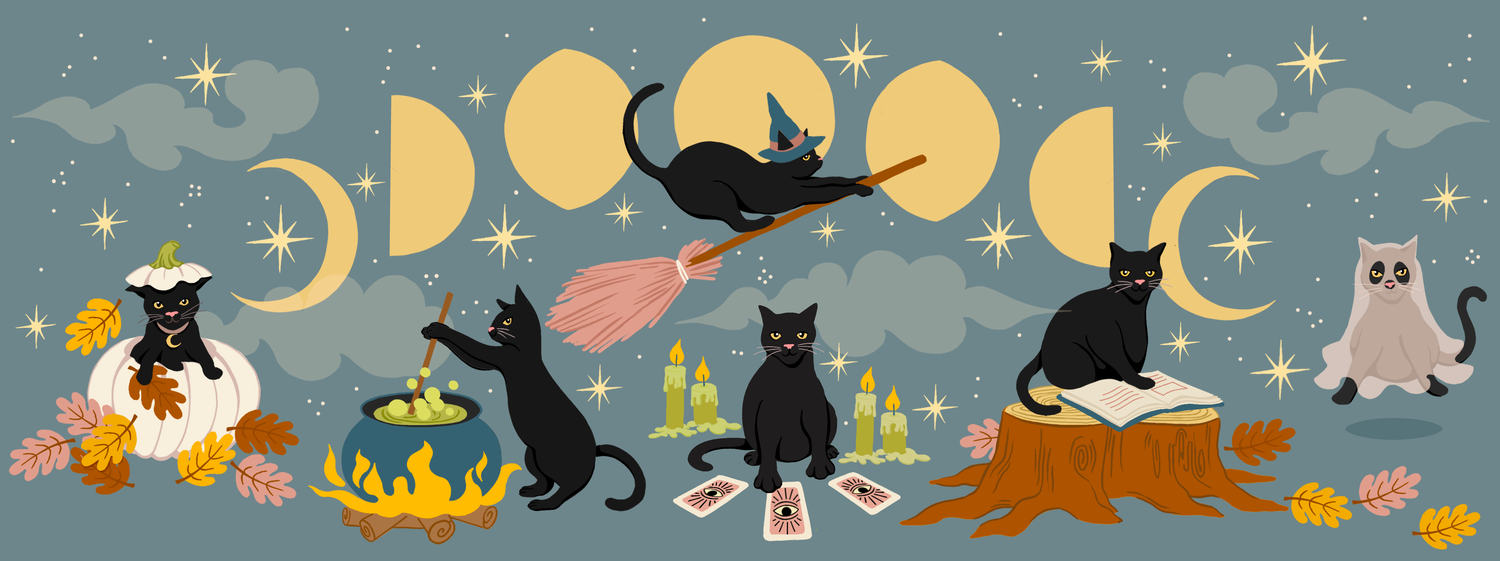Black cats have a complex history, ranging from serving as companion animals of ancient goddesses to being feared by the Catholic Church. Today, these and now becoming pop culture phenomena of the 21st century. So, what’s the consensus?
We spoke with Debra Lattanzi Shutika, director of folklore at George Mason University, about these misunderstood creatures and the true magic that lies within.
Meet the Expert
Debra Lattanzi Shutika is a folklorist and has taught at George Mason University for over 25 years. Her book Beyond the Borderlands: Migration and Belonging in the United States and Mexico won the 2012 Chicago Folklore Prize.
The Rise of Superstition
Black cats have been associated with bad luck for centuries, despite many cultures revering the sweet creatures. The origin of the bad press? Likely the Middle Ages, Shutika says.
In the 1300s, the Catholic Church began associating black cats with evil and superstition—and even sickness—as Catholicism turned its nose up at other religions practiced in Europe at the time. Consequently, black cats, associated with witchcraft, came under fire from those highest up in the church.
“Pope Gregory IX described cats, particularly black ones, as instruments for Satan,” Shutika says.
The Middle Ages were a hard time for cats in general—felines were largely blamed for spreading the Black Death around Europe.
“There were times when cats were ordered to be killed because they were associated with the plague, which is really unfortunate because the plague originated from rats, and cats were the main way to get rid of rats,” Shutika says. “So, that’s where a lot of the negativity associated with black cats and darkness comes.”
Which Cultures Got It Right About Black Cats?
But it’s not all bad news. Black cats have positive associations across multiple civilizations, both ancient and modern.
“The Greek goddess Hecate, the goddess of magic and witchcraft, had a black cat,” Shutika says. “And in ancient Egypt, cats were considered creatures that were adored and venerated, not in any way associated with bad luck or evil.”
You can also find an affinity for black cats in ancient Celtic folklore.
“There’s a lot of folklore in the Celtic region where cats, especially black cats, were considered positively,” Shutika says. “I take students to Ireland as part of a folklore study abroad, and we always visit a site called Rathcrogan. On Rathcrogan, there is a cave called Ooghanet, which means ‘the cave of the cats.”
Even today, black cats are considered symbols of good luck in Japan, especially if you happen to own a special figurine.
Etsy / UnderTheSkyGoods
“In Japan, black cats have a very positive association,” Shutika says. “The black Maneki Neko figurines bring good luck and protection against evil.”
Reclaiming Black Cat Magic
Worldwide, black cat lovers continue to chip away at negative stereotypes using the internet—what else—and as a lifelong cat owner, Shutika is grateful.
” I live for cat videos on TikTok because they’re the best, right? But there are literally thousands of videos about people talking about their black cat girlfriend or boyfriend…it shows the way that people are trying to reclaim the idea of what a black cat is and separating it from the more negative superstitions of evil, witchcraft, and bad luck.”
Adopt a Black Cat Today
Another way cat lovers can help black cats offline is to adopt one of their very own.
“They are the hardest cats to adopt out,” Shutika says. “People will take them last—except for possibly at Halloween. When I adopted a kitten once at Halloween, I remembered there was this shelter that had a litter of black cats…and the next day they were all gone!”
The message is clear: Lean into spooky season and bring home one of these magical creatures!
More from the Black Cat Magic Issue
